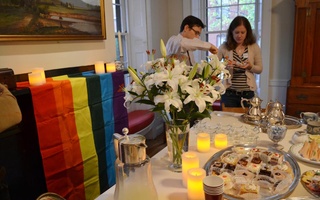On Thursday voters headed to the polls for the state primaries—the first time an election in the state has been held on a Thursday since 1988.
Massachusetts primaries, which are generally held on Tuesdays early in September, were disrupted by a rare confluence of events. The first Tuesday this year fell immediately after Labor Day. Had the primary been held on Sept. 4, municipalities would have been forced to pay workers overtime to prepare for the polls, so the date was rejected, according to Brian McNiff, spokesperson for Secretary of the Commonwealth William F. Galvin.
The next Tuesday, Sept. 11, was turned down by the State Legislature out of deference to the memorials and observances of the anniversary of the 9/11 terrorist attacks, McNiff said. September 18 falls during Rosh Hashanah, a Jewish holiday, and was rejected because it would limit some Jewish voters’ abilities to make it to the polls. Holding the election on a later Tuesday would conflict with the law that ballots must be finalized at least 45 days before the general election.
Though the effect of the unusual date is hard to pinpoint, turnout across the state was low, as noted by clerks. Debate remains as to whether voter turnout was low because voters were unaware of the election or because very few major seats were contested.
Frank Kramer, who worked the polling site at Graham & Parks School said that turnout for primary elections is frequently low. Kramer said that the fact that there were no contested statewide primaries on either ballot likely depressed numbers, but that most primary voters—who are largely perennial voters—were mindful that the election was on Thursday not Tuesday.
“It does throw people off, but if you look at whose voting…everybody who usually votes was here,” Kramer said.
On Wednesday, local pundit Robert Winters predicted that few people would get out to vote. “There’s a good chance that it will be a ridiculously low turnout,” he said.
Quincy House served as the polling location for the voting precinct that includes most of the river houses. Decia Goodwin, a resident of Cambridge who has worked at this poll for the past few years, said that it is known to be one of the quieter voting places. Only 35 people showed up to vote at Quincy House on Thursday.
Goodwin said that they often get people, mostly students, who want to vote but are unable to do so because they are not registered in the district.
“We anticipate on November 6 there will be a lot of confusion about students’ right to vote here, so we’re really pushing these voter registration forms,” Goodwin said.
Goodwin distributed forms and also reminded voters that they must register before October 17.
—Nicholas P. Fandos contributed to the reporting of this story.—Staff writer Kerry M. Flynn can be reached at kflynn@college.harvard.edu.—Staff writer Maya S. Jonas-Silver can be reached at mayajonas-silver@harvard.edu.
Read more in News
Report Cites Higher Rape StatisticsRecommended Articles
-
The Case of 'Professor' KearnsOn the inside flap of Doris Kearns's recently released book on Lyndon Johnson, a short blurb lists her academic qualifications.
-
Doris Kearns Goodwin Gets Non-Tenured Post As Government ProfessorThe Corporation this week appointed Associate Professor Doris Kearns Goodwin to the highly unusual position of non-tenured professor of Government
-
DiDomenico Wins Democratic State PrimaryEverett City Councilman Sal DiDomenico won a special primary for the state senate seat formerly held by Anthony Galluccio this past Tuesday, narrowly beating out second-place finisher Timothy R. Flaherty by roughly 130 votes.
-
 That Kind of Symbol
That Kind of Symbol -
 Dingman Hosts BGLTQ EqualiTea
Dingman Hosts BGLTQ EqualiTea -
 Tough Matchup Awaits Men's Basketball in Memphis
Tough Matchup Awaits Men's Basketball in Memphis












